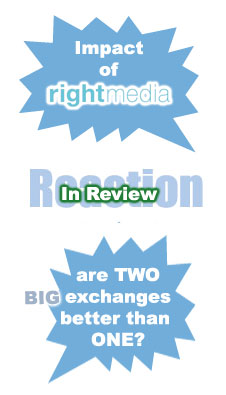This is a response to AdExchanger.com’s recent survey, “Industry Reaction: The Impact Of Right Media And The Importance Of Multiple, Large Exchanges.”
 Publicis’ VivaKi Nerve Center – Kurt Unkel, SVP
Publicis’ VivaKi Nerve Center – Kurt Unkel, SVP
Being the slacker who didn’t turn in his homework on time on this one has afforded me the opportunity to read the many excellent perspectives presented by a truly impressive cross-section of industry leaders before submitting my own thoughts. I have to agree with many of the overarching themes that come thru in the majority of the posts: Right Media was the first exchange at scale and created the industry that allows media buyers and publishers to more efficiently and effectively transact for the right impression, at the right time, for the right price. Considering we are all earning a decent living and/or enjoying a ridiculous valuation from this ecosystem RMX basically started, that’s a pretty big deal. And as it relates to having more than one exchange – I agree on the surface that competition is good, and innovation will happen at a much faster pace when there’s at least 2 players in the market. Competition also helps to ensure balance exists as markets mature, so considering where we are now as an industry, having more than one exchange makes great sense.
But I’d like to question some conventional wisdom and amplify a theme that a few touched on slightly, and this flies in the face of “competition brings innovation” concept. That is if one truly considers all the factors, we should really have just one exchange in the future. Having multiple exchanges is very inefficient for all involved. Pricing inefficiencies exist, operational costs are higher, and managing decisions & targeting data becomes many times more complex and riddled with limitations or workarounds. We seem to immediately assume that it’s more expensive to not have competition than it is to deal with these issues.
That may be true, but are we sure? Someone call the Freakonomics guys…
Another theme I’d like to offer a different perspective on: referencing the stock exchanges as a model for the industry. Totally get it, but I’d like to look at the natural gas industry as a comparison for exchanges instead. Every year, I get offers from a couple different gas companies to lock in certain rates. If I move from company A to company B, no one has to come install new pipes or set me up with new equipment. It’s one infrastructure at the consumer level. If I had to have my house torn up to move from company A to company B, probably not going to do that – too risky as those costs could be more than the gas savings, especially considering gas prices are pretty volatile. Fortunately, the gas companies agree with that thinking and there’s just one set of pipes to each consumer’s home. And that actually increases competition. Aren’t exchanges really just pipes between supply and demand? Do we really want more than one set of pipes?
So when I think about the question of one or many exchanges through these
lens, I have to put it out there that we’d be better off with a single exchange that allows any buyer and seller to connect, as it’s cheaper for all involved.
But this is only true once this market matures and the multiple ad exchanges that exist have essentially standardized their offerings relative to one another. Will that ever happen? Perhaps. However, we’re nowhere near that point, so that’s why I agree with the majority on this that multiple exchanges are best for the industry…for now.
Read the complete AdExchanger.com survey.












